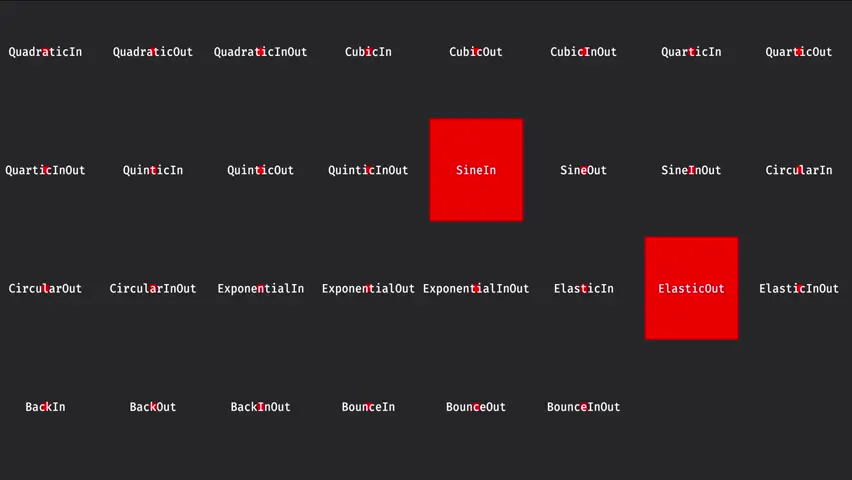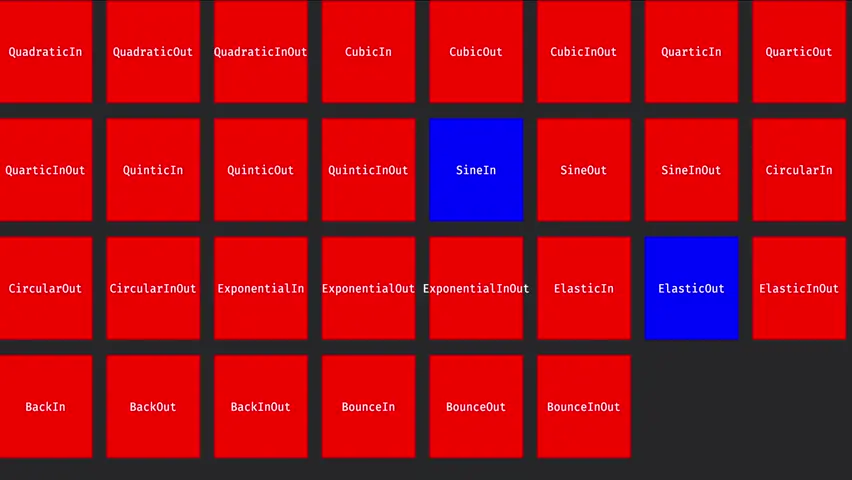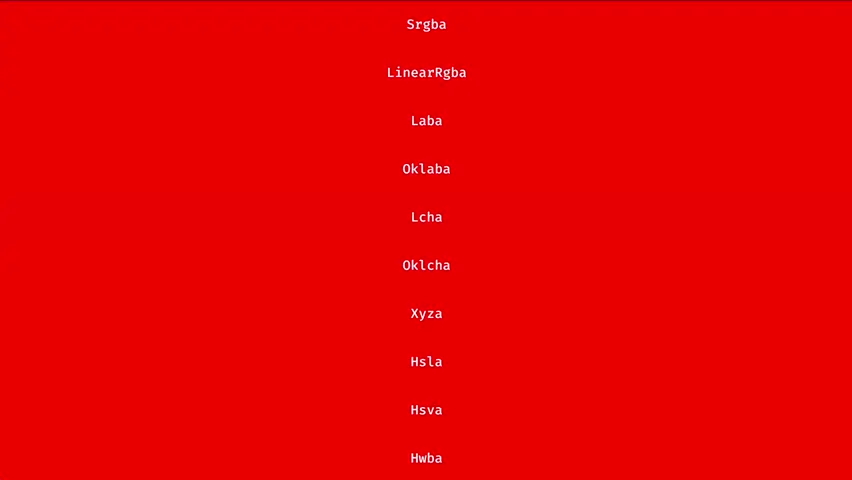Expand description
§Bevy Easings
Easings on Bevy components using interpolation.

§Usage
§System setup
Add the plugin to your app:
use bevy::prelude::*;
use bevy_easings::EasingsPlugin;
fn main() {
App::new()
.add_plugins(EasingsPlugin::default());
}§Easing a component to a new value
And then just ease your components to their new state!
use bevy::prelude::*;
use bevy_easings::Ease;
fn my_system(mut commands: Commands){
commands
.spawn((
Sprite {
..Default::default()
},
Sprite {
custom_size: Some(Vec2::new(10., 10.)),
..Default::default()
}
.ease_to(
Sprite {
custom_size: Some(Vec2::new(100., 100.)),
..Default::default()
},
bevy_easings::EaseFunction::QuadraticIn,
bevy_easings::EasingType::PingPong {
duration: std::time::Duration::from_secs(1),
pause: Some(std::time::Duration::from_millis(500)),
},
),
));
}If the component being eased is not already a component of the entity, the component should first be inserted for the target entity.
§Easing to a function-generated target
You can also ease to a target that is generated dynamically from the previous value using a function:
use bevy::prelude::*;
use bevy_easings::Ease;
fn my_system(mut commands: Commands){
commands
.spawn((
Transform::from_scale(Vec3::new(0.1, 0.1, 1.0))
.ease_to_fn(
|start| Transform {
scale: start.scale * 10.0,
..*start
},
bevy_easings::EaseFunction::QuadraticIn,
bevy_easings::EasingType::PingPong {
duration: std::time::Duration::from_secs(1),
pause: Some(std::time::Duration::from_millis(500)),
},
)
.ease_to_fn(
|prev| Transform {
scale: prev.scale * 0.5,
..*prev
},
bevy_easings::EaseFunction::CubicInOut,
bevy_easings::EasingType::Once {
duration: std::time::Duration::from_secs(2),
},
).with_original_value(),
));
}This is particularly useful to rescue you from repeatly writing initialize code for start status, or chaining animation without worrying about maintaining interior status.
§Easing using EaseMethod
The EaseMethod enum can be used to provide easing methods that are not avaliable in EaseFunction.
pub enum EaseMethod {
/// Follow `EaseFunction`
EaseFunction(EaseFunction),
/// Linear interpolation, with no function
Linear,
/// Discrete interpolation, eased value will jump from start to end
Discrete,
/// Use a custom function to interpolate the value
CustomFunction(fn(f32) -> f32),
}This is shown below
use bevy::prelude::*;
use bevy_easings::Ease;
fn my_system(mut commands: Commands){
commands
.spawn((
Sprite {
..Default::default()
},
Sprite {
custom_size: Some(Vec2::new(10., 10.)),
..Default::default()
}
.ease_to(
Sprite {
custom_size: Some(Vec2::new(100., 100.)),
..Default::default()
},
bevy_easings::EaseMethod::Linear,
bevy_easings::EasingType::PingPong {
duration: std::time::Duration::from_secs(1),
pause: Some(std::time::Duration::from_millis(500)),
},
),
));
}§Chaining easing
You can chain easings, if they are not set to repeat they will happen in sequence.
use bevy::prelude::*;
use bevy_easings::Ease;
fn my_system(mut commands: Commands){
commands
.spawn((
Sprite {
..Default::default()
},
Sprite {
custom_size: Some(Vec2::new(10., 10.)),
..Default::default()
}
.ease_to(
Sprite {
custom_size: Some(Vec2::new(300., 300.)),
..Default::default()
},
bevy_easings::EaseFunction::QuadraticIn,
bevy_easings::EasingType::Once {
duration: std::time::Duration::from_secs(1),
},
)
.ease_to(
Sprite {
custom_size: Some(Vec2::new(350., 350.)),
..Default::default()
},
bevy_easings::EaseFunction::QuadraticIn,
bevy_easings::EasingType::PingPong {
duration: std::time::Duration::from_millis(500),
pause: Some(std::time::Duration::from_millis(200)),
},
),
));
}§Custom component support
To be able to ease a component, it needs to implement the traits Default and Lerp. This trait is re-exported by beavy_easings.
use bevy::prelude::*;
use bevy_easings::*;
#[derive(Default, Component)]
struct CustomComponent(f32);
impl Lerp for CustomComponent {
type Scalar = f32;
fn lerp(&self, other: &Self, scalar: &Self::Scalar) -> Self {
CustomComponent(interpolation::lerp(&self.0, &other.0, scalar))
}
}The basic formula for lerp (linear interpolation) is self + (other - self) * scalar.
Then, the system custom_ease_system::<CustomComponent> needs to be added to the application.
§Examples
See examples
§Choosing the ease function


When easing colors, pay attention on the color space you are using

§Ease Functions
Many ease functions are available:
- QuadraticIn
- QuadraticOut
- QuadraticInOut
- CubicIn
- CubicOut
- CubicInOut
- QuarticIn
- QuarticOut
- QuarticInOut
- QuinticIn
- QuinticOut
- QuinticInOut
- SineIn
- SineOut
- SineInOut
- CircularIn
- CircularOut
- CircularInOut
- ExponentialIn
- ExponentialOut
- ExponentialInOut
- ElasticIn
- ElasticOut
- ElasticInOut
- BackIn
- BackOut
- BackInOut
- BounceIn
- BounceOut
- BounceInOut
§Bevy supported version
| Bevy | bevy_easings |
|---|---|
| main | main |
| 0.18 | 0.18 |
| 0.17 | 0.17 |
| 0.16 | 0.16 |
| 0.15 | 0.15 |
| 0.14 | 0.14 |
| 0.13 | 0.14 |
| 0.12 | 0.12 |
| 0.11 | 0.11 |
| 0.10 | 0.10 |
| 0.9 | 0.9 |
| 0.8 | 0.8 |
| 0.7 | 0.7 |
| 0.6 | 0.6 |
| 0.5 | 0.4 |
Structs§
- Ease
Value - Wrapper around a type that can be eased.
- Easing
Chain Component - Component to control a chain of easing
- Easing
Component - Component to control an easing
- Easings
Label - Label to coordinate new easing spawns
- Easings
Plugin - Plugin to add systems related to easing
Enums§
- Ease
Function - Ease
Method - Describe how eased value should be computed
- Easing
Direction - Direction of an easing. It can be backward with an
EasingType::PingPong - Easing
State - Control if an easing is played
- Easing
Type - How should this easing loop repeat
Traits§
- Custom
Component Ease - Trait to mark custom component that can be eased. It will be automatically implemented if the custom component implement
Lerp - Ease
- Trait marking components that can be eased
- Lerp
- Describes a type that can linearly interpolate between two points.
Functions§
- custom_
ease_ system - Ease system for custom component. Add this system to your application with your component as a type parameter.

